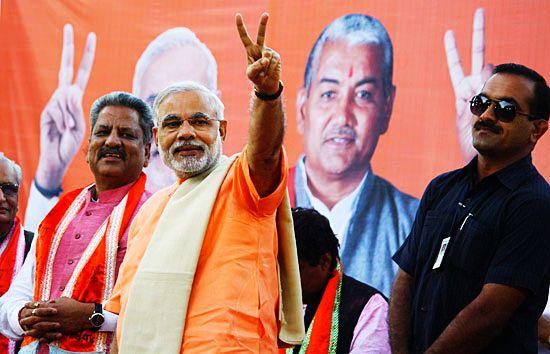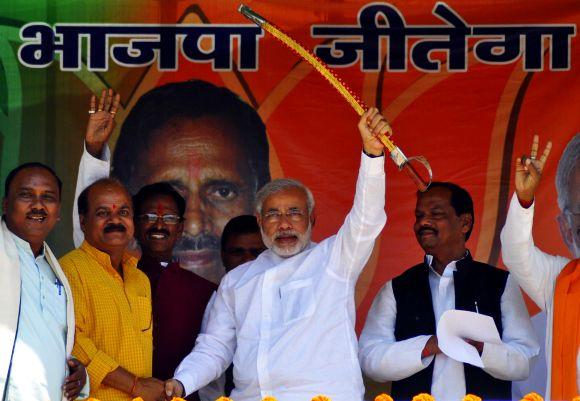Photographs: Sonil Dedhia/Rediff.com Sajid Bhombal
Narendra Modi of 2002 couldn't change Hindustan into Modistan; it is Hindustan which has changed Modi of 2002 into Modi of 2012, and that is the triumph of secularism, notes Sajid Bhombal.
A decade ago, when Gujarat voted Narendra Modi with a thumping mandate, I wrote a column in Rediff.com titled Hindustan to Modistan, simply impossible! in which I had said: 'The first thing I did after watching the electoral trends from Gujarat was to switch off the TV. It was too depressing for someone like me who has always had unquestioned faith in Indian secularism'.
I was putting on a brave face when I was arguing on Rediff.com chatrooms that Modi's victory would not last long. Indian secularism will survive in Gujarat.
In the midst of the chat, the moderator, a journalist whose political views I respect, sent me a private message: 'I wish I was an eternal optimist like you, Sajid'.
That message led me to write the column.
What did I mean by Modistan? In those days, when Modi truly proved to be a challenge to Indian secularism, Modi represented hate.
Please ...
This is not about Modi, this is about India
Image: Modi at a Sadbhavna Mission in PorbandarPhotographs: Courtesy: Narendra Modi's Web site
M J Akbar, a journalist who doesn't mince words, described the Modi phenomena in those days as follows: 'Modi is not a cynical politician. Cynicism implies a degree of indifference, and Modi is not indifferent to anything. He is passionate in whatever he does. But his preferred passion is hatred.'
'This is what makes him unique: He actually uses hatred as a political weapon, and employs both subtle and crude means to provoke a similar passion among others.'
'You can see the difference in his eyes; there is gloat floating in them. This is why it is especially dangerous to leave power in the hands of a man like him.'
But things change.
After a decade, when Gujarat gave Modi another thumping victory, I didn't switch off the TV this time. In fact I was having a bit of fun on Twitter as the trends start pouring in. I am sure M J Akbar will not write anything like what he did, today.
In 2002, I wrote the column to re-assure myself; this time I am writing to say I was right then; and my optimism in Indian secularism was not unfounded.
The Modi of 2002 couldn't change Hindustan into Modistan; it is Hindustan which has changed Modi of 2002 into the Modi of 2012.
Hindustan rejected Moditva of 2002; that is precisely why Modi had to give it up and that is why he is trying to find wider social acceptability.
This is a victory of secularism and we have to celebrate this. This is not about Modi, this is about India.
Please ...
Modi remains the most polarising politician in India
Photographs: Amit Dave/Reuters
That said; how much has Modi changed since 2002?
After consolidating his political position within the Bharatiya Janata Party and Gujarat, Modi has found a new mantra -- development.
No one doubts his administrative skills; he has shown remarkable success in implementing the projects his government initiated. His economics appeals to the urban middle class, not only in Gujarat, but all over India.
He sells Gujarat as a model state, not because of his Hindutva, but because of its economic success.
But Modi remains the most polarising politician in India.
As Modi is surely going to use this victory -- an impressive one at that -- as a spring-board to national politics, he will have to work a way out of this image.
One may win elections without enthusiastic Muslim support, but no leader can lead a diverse multi-cultural India by marginalising a large community.
Please ...
What is Modi's Muslim problem?
Photographs: Reuters
During a recent debate on the Headlines Today channel, Ashok Malik, a senior columnist, said that Modi has a Muslim problem, and he needs to address that. And how he does that is his problem. I am quoting Ashok Malik as he is known for his pro-Modi views.
What is Modi's Muslim problem? As I happen to be a Muslim, and hence a problem, let me give you a personal example.
Some time in 2005-2006, at a dinner one of my colleagues asked me a question. If I have to take a decision to put up our company's plant in India, what would be my preferred location? My reply was swift: Gujarat.
Then came the expected second question: Will you vote Modi? I again replied in a flash: No.
Both the questions were hypothetical. We were neither planning to put up a plant nor am I a voter in Gujarat. But I did explain to my friend that this is because when I have to take a decision as a business executive I have to take the best decision possible in the interest of the company.
But when I vote, I vote as a person, as an individual. The minimum I will expect from a candidate/leader to whom I may vote is that he/she wants my vote and cares for it. And Modi has shown no such inclination.
That was six years ago. Since then Modi has done a course correction. He is reaching out.
The moment he started reaching out and at least showed that he does indeed want Muslim votes, things started to change. If we go by reports from Gujarat, a section of Muslims did indeed vote for the BJP in local elections, and probably also in this assembly elections.
Is that enough?
For the purpose of writing this article, I checked with a few of my Twitter friends who happen to be Muslims, two of them from Gujarat. I asked them if they have changed their stand on Modi. The verdict was one-sided; one said he would indeed vote for Modi, others varied from 'maybe' to 'no' (the one who said yes, happens to be a Gujarati).
What came out was that yes, indeed Modi is trying to reach out, but he has shown no remorse for 2002. He is arrogant and the change in his attitude is mostly to fix his image rather than an honest attempt to reach out to the Muslims.
No one thinks that Modi will go back to what he was in 2002, but his politics is still seen as rightist -- something which unsettles a Muslim mind.
The real fear is once Modi gets out of Gujarat, he may go back to Hindutva rhetoric and marginalise Muslims.
An argument can be made that this may never happen; why should Modi give up his political capital so painstakingly gained by using the development plank, and go back to Hindutva?
But that fear among Muslims is real. That is Modi's Muslim problem.
And as Ashok Malik said, it is Modi who has to address it.
As for me, what if my friend asks the same questions on Modi today?
I will reserve my answer till I see Modi at the national level.
Sajid Bhombal can be contacted on sajid.b@gmail.com or on Twitter @sajidbhombal





article